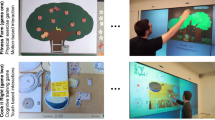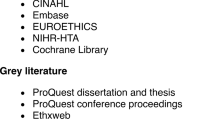Abstract
Older powered chair users’ perceptions on and attitudes towards mixed reality and modern facilitating technologies, such as tablets and smartphones, was explored to inform the design of mixed reality games that involve power mobility. Eleven older powered chair users (aged 55 and over) were interviewed in focus groups about their knowledge of, adoption of, experiences with, attitudes about, preferences for, and interest in these topics. Questionnaire and interview data were analysed using descriptive statistics and thematic analysis. Findings suggest that community-dwelling older powered chair users are a technologically forward group that use or are interested in trying new technologies and interaction paradigms, with key barriers being identity mismatch, affordability, and social acceptability. Although they did not see their use of powered chairs, new technologies, and digital entertainment as an integrated system, participants were receptive to the idea of synchronizing assistive and non-assistive technologies for the purpose of social entertainment, advanced training, and/or promoting understanding and empathy in others. In particular, the concept of a game-based mixed reality platform designed around performance mastery for older powered chair users and empathy training for able-bodied friends and family members was well-received. Initial resistance due to identity mismatch or lack of knowledge was mitigated through explanation and examples.




Similar content being viewed by others
References
Aarhus, R., et al.: Turning training into play: embodied gaming, seniors, physical training and motivation. Gerontechnology 10, 2 (2011)
Allen, M.K.: Consumption of Culture by Older Canadians on the Internet. Statistics Canada, Ottawa (2013)
Brandt, A., et al.: Older people’s use of powered wheelchairs for activity and participation. J. Rehabil. Med. 36, 70–77 (2004)
Clarkson, J.: Inclusive Design: Design for the Whole Population. Springer, Great Britain (2003)
Cresci, M.K., et al.: The digital divide and urban older adults. CIN Comput. Inf. Nurs. 28(2), 88–94 (2010)
Dickerson, A.E., et al.: Transportation and aging: a research agenda for advancing safe mobility. Gerontologist. 47(5), 578–590 (2007)
Edey, J. et al.: Powered to play: a mixed reality game for people driving powered chairs. In: Proceedings of the IEEE Games, Entertainment, and Media Conference, pp. 1–8 IEEE, Toronto (2014)
Evans, S., et al.: Older adults’ use of, and satisfaction with, electric powered indoor/outdoor wheelchairs. Age Ageing 36(4), 431–435 (2007)
Fomiatti, R. et al.: The experience of being a motorised mobility scooter user. Disabil. Rehabil. Assist. Technol. 9(3), 183–187 (2014)
Gamberini, L. et al.: Eldergames project: an innovative mixed reality table-top solution to preserve cognitive functions in elderly people. In: 2nd Conference on Human System Interactions, 2009. HSI’09, pp. 164–169 (2009)
Gerling, K.M. et al.: KINECTwheels: wheelchair-accessible motion-based game interaction. In: Proceedings of CHI’13 Extended Abstracts on Human Factors in Computing Systems, pp. 3055–3058 ACM, Paris, France (2013)
Guest, G., et al.: Applied Thematic Analysis. Sage, Thousand Oaks (2012)
Jung, Y. et al.: Games for a better life: effects of playing Wii games on the well-being of seniors in a long-term care facility. In: Proceedings of the Sixth Australasian Conference on Interactive Entertainment, pp. 5:1–5:6 ACM, New York, NY, USA (2009)
Khoo, E.T., et al.: Age invaders: social and physical inter-generational mixed reality family entertainment. Virtual Real. 12(1), 3–16 (2008)
Korotchenko, A., Hurd Clarke, L.: Power mobility and the built environment: the experiences of older Canadians. Disabil. Soc. 29(3), 431–443 (2014)
Krueger, R.A., Casey, M.A.: Focus groups: a practical guide for applied research. Sage, Thousand Oaks (2009)
LaPlante, M.P.: Demographics of wheeled mobility device users. In: Proceedings of the Conference on Space Requirements for Wheeled Mobility. University at Buffalo, State University of New York, Buffalo, NY (2003)
Melenhorst, A.-S., et al.: Older adults’ motivated choice for technological innovation: evidence for benefit-driven selectivity. Psychol. Aging 21(1), 190–195 (2006)
Milgram, P., Kishino, F.: A taxonomy of mixed reality visual displays. IEICE Trans. Inf. Syst. E77-D(12), 1321–1329 (1994)
Mitzner, T.L., et al.: Older adults talk technology: technology usage and attitudes. Comput. Hum. Behav. 26(6), 1710–1721 (2010)
Montola, M.: A ludological view on the pervasive mixed-reality game research paradigm. Pers. Ubiquitous Comput. 15(1), 3–12 (2010)
Morris, M.G., Venkatesh, V.: Age differences in technology adoption decisions: implications for a changing work force. Pers. Psychol. 53(2), 375–403 (2000)
Onwuegbuzie, A.J., Collins, K.M.T.: A typology of mixed methods sampling designs in social science research. Qual. Rep. 12(2), 281–316 (2007)
Owsley, C.: Driving mobility, older adults, and quality of life. Gerontechnology. 1(4), 220–230 (2002)
Oxley, J., Whelan, M.: It cannot be all about safety: the benefits of prolonged mobility. Traffic Inj. Prev. 9(4), 367–378 (2008)
Rosso, A.L., et al.: Mobility, disability, and social engagement in older adults. J. Aging Health. 25(4), 617–637 (2013)
Sanford, J.A., et al.: Identifying inclusive design factors that contribute to community mobility and participation of older wheelchair users. Gerontechnology. 9(2), 246 (2010)
Smith, K.T.: Needs analysis: or, how do you capture, represent, and validate user requirements in a formal manner/notation before design. In: Karwowski, W., et al. (eds.) Human Factors and Ergonomics in Consumer Product Design: Methods and Techniques, pp. 415–428. CRC Press, Boca Raton (2011)
Steyn, P.V., Chan, A.S.: Mobility scooter research project. University of the Fraser Valley: Centre for Education and Research on Aging, British Columbia, Canada (2008)
Tipping, J.: Focus groups: a method of needs assessment. J. Contin. Educ. Health Prof. 18(3), 150–154 (1998)
Torkia, C. et al.: Power wheelchair driving challenges in the community: a users’ perspective. Disabil. Rehabil. Assist. Technol. 10(3), 211–215 (2015)
Veenhof, B., Timusk, P.: Online activities of Canadian boomers and seniors. Canadian Social Trends. Stat. Can. Cat. 11-008-X. http://www5.statcan.gc.ca/olc-cel/olc.action?objId=11-008-X200900210910&objType=47 (2009)
Acknowledgments
This work was funded by the Natural Sciences and Engineering Research Council of Canada. Thanks to Joseph Moscatiello for his help with data analysis and reliability testing. Special thanks to Variety Village and Sherri Risto for helping with recruitment and providing space to run the study.
Author information
Authors and Affiliations
Corresponding author
Rights and permissions
About this article
Cite this article
Seaborn, K., Pennefather, P. & Fels, D.I. “Learn what we’re going through”: attitudes of older powered chair users towards mixed reality games that involve power mobility. Univ Access Inf Soc 15, 699–711 (2016). https://doi.org/10.1007/s10209-015-0450-z
Published:
Issue Date:
DOI: https://doi.org/10.1007/s10209-015-0450-z




